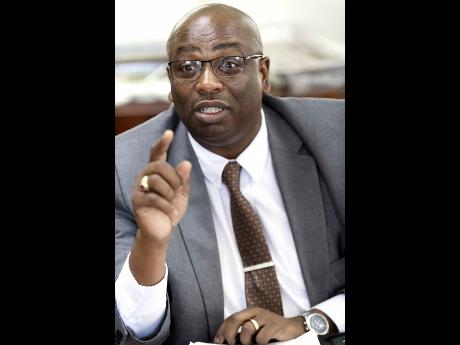The loomimg threat of stressed teachers - JTA urges its members to seek help and not to abuse students
Under pressure with crowded classroom and unruly students, scores of the island's teachers are lamenting what they say is a lack of emotional support for them when they are stressed.
According to the teachers, the lack of support could lead to some channelling their frustration on the students.
Samantha Moore*, who has been a teacher for 20 years, told The Sunday Gleaner that she has seen instances where teachers who are stressed and frustrated have physically and verbally abused students.
"For me, when I find a case where my world is crashing down around me I take a day off so I don't take it out on the people them 'pickney'. But not everybody can deal with it like that because sometimes something happens and you respond.
"So where I might hold it until I reach home, there are instances where teachers just hit children, curse, tell students things that are inappropriate and would not have been said in a regular situation," said Moore.
She argued that at her school, it is almost impossible for the two guidance counsellors there to adequately serve teachers and students.
"Think of a counsellor responding to the psychological needs of 600-plus students and the counsellors also have to take on the needs of teachers as well, and who is going to counsel them (counsellors). There is nothing else so that is where the care would come from," argued Moore.
She added that for her colleagues at the primary-school level, who usually don't have access to a guidance counsellor, the situation might be worse.
More stressful
Moore said her colleagues are not aware of any organisation, including the Jamaica Teachers' Association (JTA), which provides care for them in the form of counselling.
"The job has become more stressful over time and there's no structured care. I don't think that we as teachers know that there is any place that we can go to for care except private practice, which we would have to take money out of our pockets to pay for.
"If we don't know we can't access it, so we are going to be left here with our burdens and our struggles and our stresses," said Moore.
But JTA President Dr Garth Anderson told The Sunday Gleaner that the organisation, which represents the majority of the island's public-school teachers, has a guidance counsellor in place.
According to Anderson, the JTA recognised that teachers, like other professionals, have their struggles and go through difficulties.
"We do have a counsellor at the
disposal of teachers and she operates out of the JTA. It was something
negotiated with the Ministry of Education, which assists with the cost for paying this trained counsellor.
"Our teachers have been to see her and she has done telephone counselling sessions. No doubt that while we have this, and it is a step in the right
direction, it is something that we need to expand so that teachers can have greater access," said Anderson, as he admitted that the JTA needs to do more to ensure that teachers know this
service is available to them.
"We do advertise, and we do make pleas to teachers in our different forums and other communication lines that we have, but as much as you try there will always be somebody or some persons who are unaware of it," argued Anderson.
He said in the JTA's most recent negotiation with the Government it managed to get an agreement for the State to provide more guidance counsellors to schools.
"The number of students to guidance counsellors was reduced, which means that some schools will get some more guidance counsellors, depending on their number.
"It is a reality that the guidance counsellors are there for teachers and for students; sometimes these guidance counsellors are overwhelmed and teachers have their own issues, they have their own struggles and they need an outlet, somebody to journey with them, and the system, at the local level, is not as efficient and equipped to deal with that," said Anderson.
Use what is available
Despite the shortcomings of the system, Anderson said he is urging teachers to use what is available and avoid channelling their frustration to the students.
"It is something that as professionals we have to work on to control. You can't go to school and take that frustration out because our position in the JTA is that we cannot tolerate any form of abuse of our children.
"That is our official position. It has being communicated and we have encouraged our teachers to desist and resist any urge to use corporal punishment or to abuse our children in any form or shape," declared Anderson.
He added: "If the services are not in the schools, maybe you have to find it outside, talk to your pastor, talk to somebody else in your community who can help you to journey. But we have to try to mitigate against our struggles manifesting itself in the classrooms and our students suffer from that."
*Name changed

